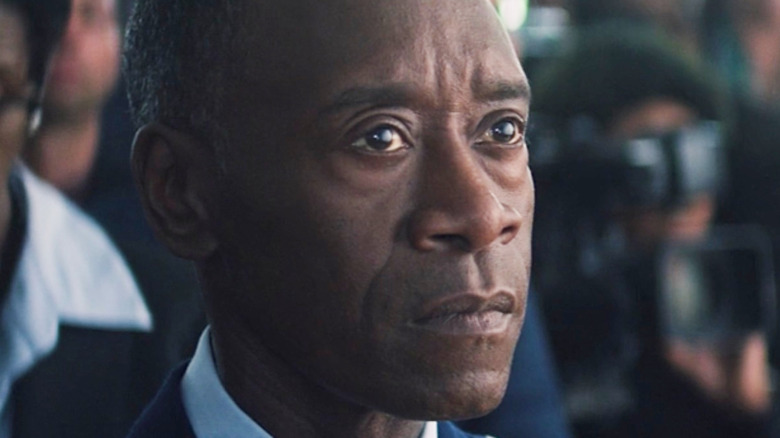How War Machine Felt About Cap's Shield In The Falcon And The Winter Soldier
Contains spoilers for "The Falcon and the Winter Soldier"
In the very first episode of "The Falcon and the Winter Soldier," Sam Wilson (Anthony Mackle) takes the Captain America shield Steve Rogers (Chris Evans) bequeathed to him at the end of "Avengers: Endgame" and hands it over to the government for museum display. Sam thinks he's doing the right thing because the shield feels "like it's someone else's," as he points out in "Endgame." Sam clearly doesn't feel he's meant to be part of the legacy that Steve has passed along.
Later, in a dedication speech during which the shield is relegated to its new, short-lived home inside a glass case, Sam expands on his feelings. "Symbols are nothing without the women and men that give them meaning, and this thing, I don't know if here's ever been a greater symbol, but it's more about the man who propped it up, and he's gone. So today we honor Steve's legacy but also we look to the future," he says. "Thank you, Captain America, but this belongs to you."
In the audience during Sam's speech is Iron Man's best friend James "Rhodey" Rhodes, aka War Machine (Don Cheadle), who later has a heart-to-heart with Sam about why he didn't take up the mantle that Steve wanted him to. "The world's broken," Rhodey tells Sam. "Everybody's just looking for somebody to fix it."
There's a certain significance to the encounter between the two men, who have similarities that go beyond their membership in the Avengers. The new "Marvel Studios: Assembled" episode "The Making of The Falcon and the Winter Soldier" features commentary from Don Cheadle, who has revealed how War Machine actually felt about that conversation with Sam.
War Machine is the 'one guy' who could understand the Falcon's situation
In the new installment of "Marvel Studios: Assembled," the Disney+ documentary series about the creation of the Marvel Cinematic Universe shows and movies, Don Cheadle explained that War Machine has conflicting feelings about Captain America's shield and Sam's initial decision to give it up. "I think Rhodey both understands why Sam doesn't want to take it on — he's been in a similar position with Iron Patriot, with a decision about Iron Man — but I think he also wishes that he would because he thinks it's very needed right now," Cheadle said.
Kari Skogland, the show's director and executive producer, elsewhere noted, "[Rhodey's] the one guy who could understand the complexity of what it is for a Black man to carry the shield. He is the one guy who Sam could connect with on that level."
In case you've forgotten the circumstances in question, they refer to events in "Iron Man 2," in which Tony Stark's (Robert Downey Jr.) identity as Iron Man becomes known globally and he begins behaving in an increasingly reckless manner. During this time, Rhodey is under pressure from the government to take on the Mark II armor for himself. Later, he rebrands it as War Machine in an echo of a quote from Stark. In "Iron Man 3," Rhodey takes on a more patriotic, less mercenary-esque identity, just like Captain America. He begins working for President Matthew Ellis (William Sadler) as Iron Patriot, but then gets lured into a trap designed to separate him from his armor.
Of course, Rhodey's relationship with Tony Stark as depicted in the "Iron Man" movies — and frankly, anyone's relationship with Tony Stark — is more complicated than Sam and Steve's friendship. Stark's more antagonistic attitude toward being a superhero, in which he feels it's a burden rather than a privilege, is different than the purity of Steve's principles. Stark wasn't happy about his friend Rhodey taking on the War Machine mantle in the first place, but he certainly trusts his friend and spiritual successor more than he trusts the government. As it turns out, despite their many philosophic differences over the course of the MCU films, this is an attitude that he and Captain America end up sharing — and they're right, based on the events of "The Falcon and the Winter Soldier."

